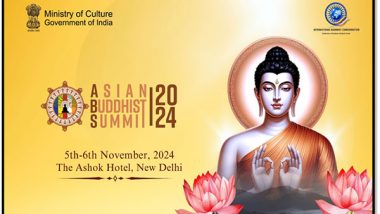By Portia Conrad
New Delhi [India], November 5 (ANI): The Buddha Dhamma, or Buddhist teachings, has continued to play an evolving role in the lives of individuals and societies around the world, adapting to the needs of each new era and culture it encounters.
Rooted in ancient wisdom, the Buddha's teachings have maintained relevance in modern times, offering insights into personal growth, ethical living, and mental clarity.
In today's world, the teachings of mindfulness, meditation, and ethical conduct have gained tremendous importance as tools for managing stress, anxiety, and depression. Meditation practices rooted in Buddha Dhamma, such as mindfulness meditation (Vipassana) and loving-kindness meditation (Metta), have been widely adopted beyond traditional Buddhist communities, even influencing secular practices in psychology and wellness programmes.
Also Read | South Korea's Military Says North Korea Fired Ballistic Missile Toward Eastern Sea.
Buddhist ethics are increasingly recognized as valuable principles for fostering social harmony and addressing global issues. The Buddha's guidelines for ethical living, like the Five Precepts (abstaining from harm, stealing, sexual misconduct, lying, and intoxication), provide a moral framework that resonates across different cultural contexts.
Buddhist teachings on interdependence (pratityasamutpada) highlight the interconnectedness of all beings and their environment. This understanding has fueled eco-conscious movements within Buddhism, emphasizing responsible stewardship of the earth as part of spiritual practice.
Buddhism's non-dogmatic, inclusive approach allows it to be a bridge in interfaith and intercultural conversations. The principles of understanding and non-judgment have allowed Buddhist teachings to gain respect in diverse religious and cultural dialogues.
Many schools and educational institutions incorporate Buddhist principles such as mindfulness and emotional intelligence into their curricula, emphasizing holistic education that includes moral and emotional development along with intellectual achievement.
The Buddha Dhamma continues to play a vital role in helping people and societies navigate the complexities of the modern world. Whether through promoting mental well-being, fostering ethical behaviour, or supporting environmental consciousness, the teachings remain relevant as they adapt to contemporary challenges, inspiring a path of peace, compassion, and wisdom. The timeless nature of Buddha Dhamma ensures its place as a guiding light for generations to come.
India's Application of Buddha Dhamma
Since independence, India has made a point of avoiding relying solely on military might in its foreign policy through the adoption of numerous concepts, such as the Panchsheel Initiative. In order to promote India as a worldwide force and as a guide for its foreign policy, the Panchamrit principles have long been embraced. Sanskriti evam Sabhyata (culture and civilizational links), the fifth of these listed principles, expresses the government's aim to capitalize on India's historical ties to other nations as part of its non-coercive soft power strategy.
Although having a relatively small population of Buddhists, India has a few factors working in its favour to claim legitimacy in its promotion of Buddhist diplomacy for a variety of reasons. First, Buddhism has its roots in India, giving it a unique claim to historical legitimacy.
Second, there are many important Buddhist sites in India, including Bodh Gaya, Sarnath, and Nalanda.
Third, India has cultivated a reputation as a champion of the oppressed because of the Dalai Lama and the Tibetan Parliament, which are both exiled in the city of Dharamshala as a result of the conflict with the Chinese government. It is indeed interesting to note that there has long been a connection between Buddhism and state diplomacy, going all the way back to Ashoka and his acceptance of Dharmavijaya. Buddhism is also an important factor that is being used by India to strengthen ties with Asian countries and contribute to other, more general foreign policy goals like the "Act East" and "Neighborhood First" policies.
As India hosts the 1st Asian Buddhist Summit today in the August presence of President of India Droupadi Murmu, Minister of Parliamentary Affairs and Minority Affairs Kiren Rijiju and Union Minister of Culture and Tourism Gajendra Singh Shekhawat. The effort may be seen as a significant diplomatic effort to strengthen ties rooted in shared cultural heritage.
The summit organised by International Buddhist Confederation (IBC) under the aegis of Ministry of Culture, Government of India on November 5th - 6th, 2024 in New Delhi on the theme 'Role of Buddha Dhamma in Strengthening Asia' will underscore fostering regional unity and its potential as a strategic tool to enhance cooperation in various aspects.
Written by Portia Conrad, Head of International Relations Division at the International Buddhist Confederation. (ANI)
(This is an unedited and auto-generated story from Syndicated News feed, LatestLY Staff may not have modified or edited the content body)













 Quickly
Quickly

















